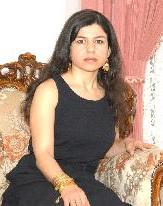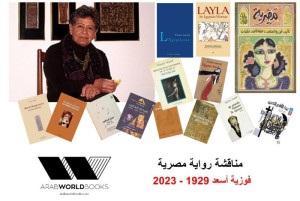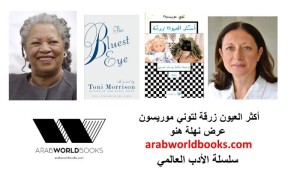Originally published by MultiCultural Review (July 2010)
Twelve years ago, I was on a transit at Heathrow Airport when I entered a bookshop and saw a rack of Middle Eastern novels written by Western authors. The covers all portrayed veiled women running away from an abusive husband, father or brother. Women I’d never known personally, not at home in America or in my birth country of Iraq. Although I realize they do exist everywhere.
I came home looking for stories that portrayed the healthier part of the Middle Eastern world. There were hardly any out there. Unfortunately, the situation is the same today. As a result, Westerners and non-Muslims are left with one general perception of the people of that region and empowering stories like the one about Prophet Muhammad and his first wife Khadija are rarely told much less learned from.
At the age of 25, Prophet Muhammad became employed by Khadija, who was a wealthy Christian, twice widowed, and a merchant 15 years older than he. He made several successful journeys to Syria which impressed Khadija, and she ended up proposing to him. Rather than focus on Khadija’s age and be intimidated by her confidence and power, Muhammad esteemed her brilliant character, superior business acumen and humanitarian efforts that led her to be hailed as the Princess of Mecca. Thus, he made her his wife. He remained monogamous to her for 15 years (until her death), she was the one person to whom he turned to for advice, and she helped him both financially and intellectually to found Islam.
Given this history of Muhammad, it should not be a surprise that contrary to popular Western belief, he cared to elevate women’s status. Over 1400 years ago Islamic Law guaranteed rights to women that women in Europe and America only obtained in the 1900s. According to Islamic Law women have the right to own property, operate a business and receive equal pay for equal work, have total control of their wealth, marry whom they want, keep their own name when married, inherit property and have their marriage dissolved in the case of neglect or mistreatment.
I interviewed three Muslim women who are from various backgrounds about their roles in Islam, and each described why she feels empowered by her religion.
Divorce
Norma Kassim lives in Malaysia, is a single mother of six children, working fulltime as a business development manager in a male dominated industry—construction—and studying part-time as a doctoral candidate in Islamic Philosophical Thoughts at the International Islamic University of Malaysia. She is the author of A Walk Through Life: Issues and Challenges Through the Eyes of a Muslim Woman.
“Islam provides me with the discipline and guidelines for carrying out my responsibility as a mother to six children,” said Kassim, “the correct ethics to fulfill my job duties, and the spiritual strength from the knowledge that I gain from scholars in my school. Equipping myself with knowledge of the Islamic faith and what is required of me as a Muslim woman helps me to be in control of my life and to understand my destiny.”
Kassim comes from more than five generations of conservative Muslims. Her father and grandfather were imams, Muslim religious leaders, who provided the women in the family a comfortable living while encouraging them to gain higher education and work outside the home. Kassim chose to be a housewife after she got married.
“We follow the Shafi’i Mazhab and practice Islam diligently,” said Kassim. The Shafi’i school gives equal weight to the traditions (hadith/sayings of Muhammad) and the Quran, emphasizing the consensus of the Islamic community as the most important secondary source of law. “The women in the family are protected, not discriminated by the men and they are amply provided for. My mother even persuaded my only brother [of five daughters] to take just one share of his inheritance from my late father as he is not married and has no responsibilities. We eat together in family meals, voice our opinions freely, are allowed to travel and go out on our own, and use our income independently.”
In her book A Walk Through Life: Issues and Challenges Through the Eyes of a Muslim Women Kassim encourages women to take responsibility and accountability for their life choices and to increase their self esteem and self respect. She sheds the myth that Eastern women are expected to be submissive; thus they are oppressed. Using specific examples, she discloses various ways in which the Quran and Prophet Muhammad helped elevate women’s status over 14 centuries ago.
Kassim attributes gender discrimination to ignorance; lack of exposure to information about women’s rights as a Muslim, wife, and mother; to people becoming comfortable with the contemporary life and forgetting the real reason for existing on earth; to accepting aged-old cultural and traditional practices, some of which are not acceptable to Islamic values; and to being excessively influenced and immersed in identifying their lives according to Western values.
Using Khadieja, Prophet Muhammad’s first wife, as an example, she reminds women that it’s okay to initiate marriage proposals, that those who do have high self-worth and therefore are ready to face the risk of rejection. She points out that women in Kelantan (a state in the East Coast of Malaysia) take a more proactive role in initiating marriage, breaking the old relationship theory that man is the hunter and woman the hunted.
Advising women to create a mutually supportive and rewarding relationship in marriage, through communication, non-judgment, responsibility, and forgiveness and by maintaining her independence, Kassim also discourages women from remaining in physically, emotionally, or verbally abusive relationships. She urges women in such situations to not blame themselves and to seek help and support rather than get caught in the trap.
Kassim constantly looks at the big picture, allowing for healthy relationships – even with an ex-husband, his mother, and his new wife. She realizes the importance of raising children well, having the insight to not be led by personal insecurities and most importantly, confiding in God to walk a loving and strong path.
“Even though my marriage ended with a divorce, it was a good marriage as my ex-husband was responsible in his duties as a husband and father,” she said. “I have a healthy attitude towards marriage and love. I prefer to look at any failed love relationship in my life as the responsibility of both parties involved.”
Work and Motherhood
Nouran Abdul Jawad is a married Saudi woman from Medina, but she has been living in Malaysia for almost two years and is pursuing her master’s studies in Islam. She lived for seven years in England, and then was raised in Riyadh, the capital of Saudi Arabia. She says that Muslims regard the whole universe as a big mosque, that every good occupation man is involved in is a chance for him to get closer to Allah.
“Some people might wonder why righteous Muslim women would waste their time in useless jobs such as hairdressers and makeup artists,” she said. “But Islam regards all occupation as a noble thing as long as your intention is good.”
She states that in the Quran, Allah refers to males and females as being created from the same soul. “It is he who created you from a single person, and made his mate of like nature, in order that he might dwell with her in love.” (Quran, Al-Araf: 189).
“During the days of the prophet women involved themselves in all occupations even in battle, and their role was more than just raising the morale of the fighters and nursing the wounded,” she said. “Nusaibah bint kaa’b and Safiyya bint Abd al-Muttalib were reported for participating in the actual fight.”
She points out that around the world, many women work not out of desire but because they have to participate in the expenditures of their family. Yet in Islam it is the man—husband, father or brother –who is responsible for expenditures. “This is an honor Islam gave to women,” she said, explaining that most Muslim women go to work because they want to benefit others and to have a social life. The heavy load of gaining money to spend on children is removed from women’s shoulders. Also, a husband doesn’t have the right to ask his wife where she spent her salary.
“Islam regards the duty of raising the children in the best manner as the noblest occupation a woman can do,” she said. “As you can see women who are very occupied in their jobs might neglect their children. Therefore Islam regards the care of the children as the most important duty on both parents and on a mother specially. Her care for her children and home is regarded as a form of worship. Prophet Mohammed mentions that paradise is under the feet of mothers; this is an indication of the important role a mother plays in Islam. If a mother knows that she can arrange herself between her house and job then she is most welcome to involve in the profession she desires.”
She adds that Islam does not blame Eve for the original sin but finds both Adam and Eve responsible for it and feels that while the West labels many of Islam’s issues, which they have little awareness of, as oppressive to women, they fail to view their own oppressions towards women. “Women in the West are being used sexually,” she said. “They are regarded as an object for man’s pleasures. We frequently hear of western men cheating on their wives, but we don’t label her as oppressed. We do however do that when a Muslim man marries another woman—for a crucial reason—and informs his wife before arranging for his marriage.”
In the past, men used to marry unlimited number of women. Islam actually restricted the unrestrained polygamy of the Arabs of the time, and put many laws in place to protect the well-being of women, like ending the pagan Arab practice of killing their baby daughters when they were born.
Islam limited the number of wives to four, and allowed it to apply under certain circumstances. A Muslim can marry another woman if his wife is barren or if a wife neglects all her duties towards her husband, for instance abstaining herself for a long time from having sex with him. “The man, instead of having all different kinds of affairs and cheating, Islam premised him to marry another,” Abdul Jawad said.
In all situations, a man must discuss this need to have a second wife with his first wife, and if she doesn’t consent, she has the right to leave him.
“Marrying another wife is a serious and huge burden on the husband,” she said, “because Islam gave the permission for men to marry but asked them to be equal and just towards all their wives. In order to be just, man needs to have the wealth that enables him to be equal to both his wives and to his children from both wives.”
Abdul Jawad reveals that her home life has both positive and negative aspects, as does everything else. The positive is the strong family relations. At least once a week, the whole family gets together for lunch. This creates a strong bond between children and their grandparents and the aunts and uncles. Because family plays an important part in her country, all families support each other in time of marriage and different occasions. This bond leads the male figures to be very close to and supportive of females.
“Many help their wives with house chores,” she said. “Just like my husband, since we are both students in Malaysia and we don’t have a maid, he helps me with house chores. If a woman has a party at night and has to leave the child at home, her husband will watch them. But of course this varies depending on the nature of the man.”
Abdul Jawad was engaged when she was 22 years old and married at 23. Her husband is a cousin who loved her for a long time without her awareness. He proposed to her parents after he returned from Canada.
“I felt comfortable in his presence and initially approved,” she said. “I told him, ‘I need some time to know more about you.’ We were allowed to speak privately but in the presence of the family. For example, we used to take a corner in a room where some members of our family who are occupied in their own talks exist, and we had our own private conversation. We were allowed to go out to public places like restaurants and coffee shops to talk. Both of us were very frank and honest to each other and this helped me much in forming the correct image about him. The moment I felt deeply connected to this man and happy with the idea that he would be my husband we decided on a date for our wedding.”
She says that while in some countries parents force their daughters to marry certain men, such an act is forbidden in Islam. “A marriage without the bride’s approval is not valid.”
Aside from family unity, Islamic traits such as generosity and hospitality are also important qualities in Abdul Jawad’s home town, especially when it concerns guests. “Our happiness is derived from the comfort of our guests,” she said. “If I was wearing a ring and my friend compliments it, I immediately take it off and offer it to her. This is a habit Prophet Mohammed used to practice with people.”
The negative part about her country is the fundamentalist mentality that exists mostly in the capital. The western side in Saudi Arabia includes Jeddah, Makkah, and Medina, and it is very different in nature from the capital in that one rarely finds fundamentalists in the western part.
“Fundamentalist practice things in the name of Islam which has totally no relation to Islam,” she said. “For instance, these people cover their faces and regard the voice of women as seductive. They think that women shouldn’t wear trousers because she would be intimidating guys. All of these ridiculous thoughts which have nothing to do with Islam are being practiced by narrow minded people who are in total distance to Islam.”
The Student
Sarah Alfaham is a student at the University of Toledo, where she is the president of the Muslim Student Association, and she is the assistant director of photography and a news reporter for the Independent Collegian. She worked as a reporter for the SPJ’s “The Working Press” publication at the SPJ’s Annual Convention in Washington D.C. in 2007 and she will intern this summer at the Richmond Times-Dispatch.
Alfaham strives to insert Islam into every aspect of her life because she feels that as a woman, Islam has strengthened her—from her image as a woman to trying to perfect her grades as a student. It has helped her to go into the world and speak out and be active, and as a journalist, to get the facts straight because she is held accountable for them.
“I think that non-Muslims who look for something negative will take any verse (of the Quran) out of context and run with it,” she said.
Alfaham has one sister and one brother. Her father has encouraged all the children to choose careers that they are passionate about. Her everyday life consists of going to school and working six to seven days a week. She’s out of the house from about 9:30 am, coming back home varying from 6 pm to 10 pm. Because she is active in her community, she attends many conferences and events.
“Although my sister and I are always tired when we get home, we are expected to help out around the house for at least 10 minutes every day,” she said. “My brother, who is still in high school, comes home a lot earlier and definitely does a lot more than 10 minutes in addition to helping take care of my youngest sister.”
Alfaham says that in her household they are not judged by gender but by conditions and circumstances. “As long as I put family first and I get good grades, I can go after what I’m passionate about.”
Wishing that people would better understand the meaning of hijab, or the scarf, she once posted an article on Facebook called “Why I wear Hijab—Not Your Typical Answer.” She had noticed that a lot of Muslim girls either didn’t know why they wear Hijab or non-Hijabis wanted to know what motivates Hijabis to wear Hijab. And non-Muslims didn’t know why Muslim girls wear “that thing” on their head.
She wrote: “Hijab in Arabic literally means a barrier. In the context of the scarf that we wear, while the cloth on the head is called hijab, it’s not only limited to that meaning. Hijab is really the entire manner of walking, talking, being modest, and holding yourself in a manner that’s respectable. In Arabic that’s all one word, but in English it’s like a paragraph.”
Alfaham believes God made it mandatory for women and men to cover in different ways and that women taking off their clothes are in reality enslaving themselves to their bodies by having men look at them like a piece of meat.
“Women are more than just a piece of meat or a body,” she said. “I feel a hijab forces me to act and hold myself up in a certain dignified manner, someone who is proud of being Muslim. A friend put it in a good way by saying, ‘Hijab is a tool that enables you to have a voice and command yourself with respect in all arenas.’”
She also feels that hijab is about her identity as a Muslim-American. For her, taking it off would mean denying her religion.
“When minorities first come to the U.S., they are discriminated against—any minorities and all minorities,” she said. “African Americans started becoming more integrated in society in the ‘40s and ‘50s. There were young African-American youth that were doing everything they could to be like White Americans, to the point of changing their hair or trying to lighten their skin. Before groups like Marcus Garvey and the Nation of Islam (NOI) as well as other groups which helped shape the identity of African Americans in this country, many African Americans were not proud of their skin color.”
She uses the movie Malcolm X as an example. In it, there’s a scene where the young Malcolm X, at the time not Muslim, does a “conk” in which he straightens his hair.
“This, to me, is the ultimate form of denying your culture and degrading yourself,” she said. “When African Americans at the time were not proud of themselves, they were looked down upon. When they started to unite and be proud of who they are, they were respected and the level of their status in society started to rise. Not to say that they are where they want to be… it’s still a long way, but at least the key way to get there was found by respecting themselves rather than watering down their culture and identity.”
She states that while this is her take on why she wears hijab, it is not in anyway to degrade or to put down Muslim women who don’t.
“I know way too many non-Hijabis that know more about the Quran than I do, have better knowledge of Islam, or have done more for this Ummah (Muslim community) than I could ever dream of for me to put anyone down like that,” she said. “Only Allah can judge us.”
Perspectives on Islam
All three women attribute the negative outlook against Islam to Western ignorance, a few extreme fundamentalists, and the media that takes these people as the face of Islam. For the most part they agree that Muslims and non-Muslims alike are to blame for the lack of understanding.
“Issues about Islam analyzed from the Western perspectives have a totally different spiritual outlook and developments,” said Kassim, “thus causing distorted understandings even among the Muslims. The Muslims themselves are guilty of not practicing and interpreting the true teachings of Islam in totality.”
“Muslims who are Muslims just by name and who do not reflect Islam in their behavior are misrepresenting Islam throughout the world,” said Abdul Rahmad. “Also, non-Muslims who are either ignorant or prejudice tend to divert people from Islam through their wrong interpretations about Islam.”
“I wish people understood Islam as a religion that is very similar to the monotheistic religions,” said Alfaham.
Conclusion
The most interesting aspect of Islam is that, unlike other religions, it is not named after its founder or the community and nation of its birth. Islam is an attributive title that signifies submission to God, Creator of the Universe. Whosoever possesses this attribute, may he or she belong to any race, community, country, or clan is a Muslim. This includes the sun, moon, earth, and stars, since matter, energy, and life all obey God’s laws and grow and change and live and die in accordance with those laws.
One wonders why the West embraces the teachings of many different religions yet has not only deviated away from Islam but has linked it to stigma. As a result, we are completely unaware of the words Muhammad used in his last sermon which was delivered on 632 A.C., ninth day of Dhul al Hijjah, 10 A.H. in the Uranah valley of Mount Arafat:
“Fear Allah in your women! For the one whom honors them is indeed an honorable man, and one whom humiliates them is indeed a base (lowly and ignoble) man… O People, it is true that you have certain rights over your women, but they also have rights over you.”
Women aside, what Muhammad expressed also in his last sermon is a true form of tolerance and equality about society in general: “All mankind is from Adam and Eve, an Arab has no superiority over a non-Arab nor a non-Arab has any superiority over an Arab; also a white has no superiority over a black nor a black has any superiority over white except by piety and good action.”
As a Christian, I am able to see the benefit of such words and use them to my advantage as well as to the advantage of our earth, without losing sight of my own religion. Thoughts, words, and actions are not restricted to any land or religion. They are created by God and are free for all to sample.




